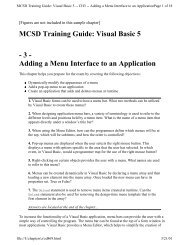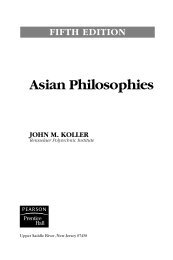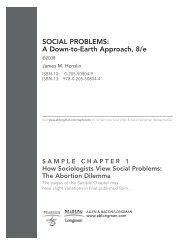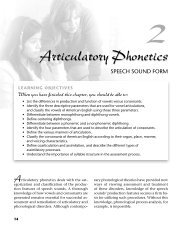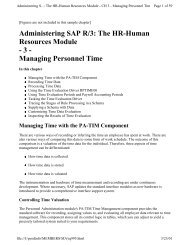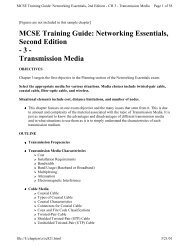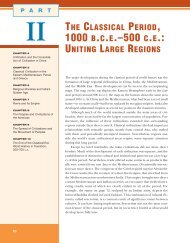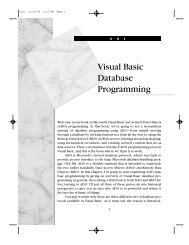CULTURE, language, AND COGNITION
CULTURE, language, AND COGNITION
CULTURE, language, AND COGNITION
Create successful ePaper yourself
Turn your PDF publications into a flip-book with our unique Google optimized e-Paper software.
GA305c05.qxd 4/30/2004 11:26 AM Page 105<br />
� Infancy<br />
Early Cognitive Development<br />
in Cultural Contexts<br />
infancy 105<br />
Piaget’s and Vygotsky’s interest in children’s intellectual development as a<br />
focus for understanding how ideas change over time has drawn attention to<br />
several important issues related to the study of cultural differences. Over a<br />
period of thirty years, hundreds of researchers throughout the world have<br />
subjected these theories to careful scrutiny, with the result that the crosscultural<br />
literature is immense and cannot be given here anything approaching<br />
the full attention it deserves. However, there are a number of excellent<br />
reviews that we recommend to those who would like to pursue the topic further.<br />
These include the work of Rogoff and Chavajay (1995), Gielen (1994),<br />
Bronfenbrenner (1993), and Segall, Dasen, Berry, and Poortinga (1999).<br />
Of all Piaget’s periods, the sensorimotor (occurring during infancy) has<br />
been the least studied from a cross-cultural perspective. A major reason is<br />
that observation methods and data-collecting techniques based on Piagetian<br />
concepts have only recently been standardized (Cole, 1995). According to<br />
Dasen, the first cross-cultural study of sensorimotor intelligence, using a scale<br />
developed by Corman and Escalona (1969), was conducted in Zambia (Goldberg,<br />
1972). In general, while minor differences in behavior were noted (a<br />
slight advance for African infants over American at six months and a slight<br />
lag at nine and twelve months), Goldberg’s findings tend to support Piaget’s<br />
observations. A later study, conducted by Dasen and his colleagues (1978) on<br />
the Ivory Coast, suggested that African infants are advanced in their development<br />
of object permanency and other object-related cognitive behaviors. In<br />
yet another African study, this one conducted in Nigeria, Mundy-Castle &<br />
Okonji (1976) reported that while early manipulation of objects is similar for<br />
English and Igbo infants, important differences emerge in later interactions.<br />
What they have to say about these differences lends support to our emphasis<br />
on the importance of looking at cognitive behavior from an ecological point<br />
of view. Specifically, Mundy-Castle (1974) proposed that, after a certain age,<br />
European and American infants develop increased experiences in the handling<br />
of objects, with their attention “more often deliberately focused on objective<br />
properties of reality,” whereas “African babies receive more social<br />
stimulation and early emotional support than European babies. The issue<br />
here is whether in the long run this divergent stimulation brings about a differential<br />
patterning of cognitive development, with Africans acquiring an intelligence<br />
that is more socially oriented, while Europeans acquire one that is<br />
more technologically oriented” (pp. 19–20). Although not specifically mentioned,<br />
since this was not the concern, the microsystem (family) and<br />
macrosystem (cultural values) have an important effect on the development<br />
of these cognitive behaviors.





